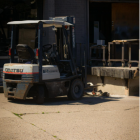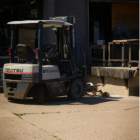As the holiday season rolls around, construction companies down under are often caught up in the festive rush, trying to complete projects before the year’s end while also ensuring their books are set straight for tax time. Year-end tax planning is a significant concern for these companies, and understanding how to maximize deductions and credits can lead to substantial savings, which can be reinvested into operations such as equipment upgrades or additional hires—including, quite crucially, forklift hire and servicing.
During holidays, construction companies might look towards hiring forklifts rather than purchasing them to meet short-term needs without incurring long-term capital expenditures. Engaging in forklift hire Sydney services provides the flexibility to handle increased workload during peak seasons without committing to the expense and upkeep of owning. In such cases, the costs associated with hiring forklifts, servicing, and repairs can be written off immediately, offering a potential tax advantage.
But it’s not just about hiring equipment; forklift servicing Sydney initiatives also play a part. Regular servicing ensures that your equipment is in top working condition and can save you money in the long run by preventing costly repairs or downtime. In terms of tax planning, the costs associated with preservation can be categorized as business expenses and are also generally tax-deductible.
The decision between diesel forklift vs electric forklift may also be influenced by tax considerations. The 179D deduction mentioned in the other article, while pertaining to energy efficiency in buildings, opens up the dialogue about the benefits of investing in energy-efficient equipment. Electric forklifts, for instance, are often seen as more sustainable and can potentially contribute to an overall strategy of investing in energy efficiency. Regarding long-term tax planning and potential credits, opting for electric over diesel could prove financially strategic.
The same principle applies to Toyota forklifts—if a construction company decides to purchase instead of hire, choosing a reputable brand like Toyota may offer better long-term value through higher reliability and lower maintenance costs. These costs, coupled with the possibility of higher resale value, can indirectly affect tax outcomes by impacting depreciation schedules and asset valuation.
Of course, for those purchasing forklifts, analyzing work in progress schedules is just as important for managing tax liabilities. It can be particularly relevant when deciding the timing of major equipment purchases, like forklifts, given the opportunity to either defer income or accelerate depreciation for tax optimization.
In the context of specialized accounting methods, such as those under Internal Revenue Code §460 applicable to contractors, decisions around Forklift Repairs and servicing become part of a larger strategic tax planning discussion. Proper accounting for repair expenses can help manage taxable income, leverage tax credits, and potentially benefit from bonus depreciation.
The mention of amortization of specified research or experimental expenditures leads us to think about innovation in the materials handling sector. Suppose a business invests in have taken on new research to customize or introduce technology in their fleet of forklifts. In that case, these expenditures should be factored into tax planning to utilize the available amortization opportunities. This innovative approach could translate into significant tax savings if appropriately reported.
Finally, non-corporate taxpayers entrenched in the construction industry need to be vigilant about excess business loss limitations. While these tax limitations can affect business owners across industries, they are especially pertinent to construction companies due to the high costs of machinery and the propensity for fluctuating income.
In summary, year-end tax planning for construction companies, while complex, offers opportunities to leverage expenses associated with forklift hire and servicing into tax benefits. Understanding how each financial decision—be it hiring a diesel forklift, maintaining a fleet of Toyota forklifts, or opting for electric models—affects the overall tax situation is critically important.
Working with a tax professional who understands the specific needs of the construction industry, including the nuanced implications of financial dealings regarding forklift hire, servicing, and repairs, can provide an avenue to not just compliance but also fiscal efficiency and strategic business growth as Australian construction companies sail into the new year.




